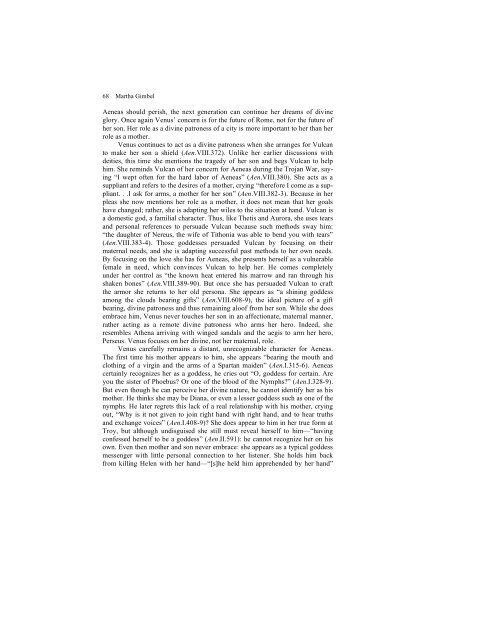You also want an ePaper? Increase the reach of your titles
YUMPU automatically turns print PDFs into web optimized ePapers that Google loves.
68 Martha Gimbel<br />
Aeneas should perish, the next generation can continue her dreams of divine<br />
glory. Once again Venus’ concern is for the future of Rome, not for the future of<br />
her son. Her role as a divine patroness of a city is more important to her than her<br />
role as a mother.<br />
Venus continues to act as a divine patroness when she arranges for Vulcan<br />
to make her son a shield (Aen.VIII.372). Unlike her earlier discussions with<br />
deities, this time she mentions the tragedy of her son and begs Vulcan to help<br />
him. She reminds Vulcan of her concern for Aeneas during the Trojan War, saying<br />
“I wept often for the hard labor of Aeneas” (Aen.VIII.380). She acts as a<br />
suppliant and refers to the desires of a mother, crying “therefore I come as a suppliant.<br />
. .I ask for arms, a mother for her son” (Aen.VIII.382-3). Because in her<br />
pleas she now mentions her role as a mother, it does not mean that her goals<br />
have changed; rather, she is adapting her wiles to the situation at hand. Vulcan is<br />
a domestic god, a familial character. Thus, like Thetis and Aurora, she uses tears<br />
and personal references to persuade Vulcan because such methods sway him:<br />
“the daughter of Nereus, the wife of Tithonia was able to bend you with tears”<br />
(Aen.VIII.383-4). Those goddesses persuaded Vulcan by focusing on their<br />
maternal needs, and she is adapting successful past methods to her own needs.<br />
By focusing on the love she has for Aeneas, she presents herself as a vulnerable<br />
female in need, which convinces Vulcan to help her. He comes completely<br />
under her control as “the known heat entered his marrow and ran through his<br />
shaken bones” (Aen.VIII.389-90). But once she has persuaded Vulcan to craft<br />
the armor she returns to her old persona. She appears as “a shining goddess<br />
among the clouds bearing gifts” (Aen.VIII.608-9), the ideal picture of a gift<br />
bearing, divine patroness and thus remaining aloof from her son. While she does<br />
embrace him, Venus never touches her son in an affectionate, maternal manner,<br />
rather acting as a remote divine patroness who arms her hero. Indeed, she<br />
resembles Athena arriving with winged sandals and the aegis to arm her hero,<br />
Perseus. Venus focuses on her divine, not her maternal, role.<br />
Venus carefully remains a distant, unrecognizable character for Aeneas.<br />
The first time his mother appears to him, she appears “bearing the mouth and<br />
clothing of a virgin and the arms of a Spartan maiden” (Aen.I.315-6). Aeneas<br />
certainly recognizes her as a goddess, he cries out “O, goddess for certain. Are<br />
you the sister of Phoebus? Or one of the blood of the Nymphs?” (Aen.I.328-9).<br />
But even though he can perceive her divine nature, he cannot identify her as his<br />
mother. He thinks she may be Diana, or even a lesser goddess such as one of the<br />
nymphs. He later regrets this lack of a real relationship with his mother, crying<br />
out, “Why is it not given to join right hand with right hand, and to hear truths<br />
and exchange voices” (Aen.I.408-9)? She does appear to him in her true form at<br />
Troy, but although undisguised she still must reveal herself to him—“having<br />
confessed herself to be a goddess” (Aen.II.591): he cannot recognize her on his<br />
own. Even then mother and son never embrace: she appears as a typical goddess<br />
messenger with little personal connection to her listener. She holds him back<br />
from killing Helen with her hand—“[s]he held him apprehended by her hand”

















